

Some time ago, my friend Leon Jahae asked me to act as a guide for a group of fruit growers from Lake Constance as they visited fruit growers in Gloucestershire, Hereford and Worcestershire.
The Lake Constance region is well known for high quality fruit production, but this season the region has been badly affected by the spring frosts which have decimated areas of fruit production in Europe.
The visiting group was made up of 28 fruit growers and three fruit advisors from Bodensee. Leading the Bodensee group; Manuela Schielin who is a an advisor to fruit growers in Lake Constance. Manuela speaks excellent English (she studied English at school) and was able to translate with accuracy the comments from the 'hosts' in West Midlands and questions from the German visitors.
The first visit on Monday morning was to Michael and Christiana Bentley at Castle Fruit Farm at Newent in Gloucestershire.
I have known Michael and Christiana since they bought Castle Fruit Farm in 2002 and it is now seven years since I last visited them.
From 'Bentley's Castle Fruit Farm' website we learn the history of Castle Farm: "The farm straddles the parishes of Dymock and Oxenhall. It appears from old maps that fruit has been grown here for a long time. The farm house is built on the site of a fortified farmhouse and across the road is the landmark of Castle Tump. The farm has a windmill, built in the 1920's by one Lancaster Burns, which we are maintaining but sadly is not working now. We hope to restore it one day".
Castle Fruit Farm produces dessert and culinary (Bramley) apples, pears , plums and cider apples, with a small area of cherries.
The dessert apple varieties are: Queen Cox, Ashmeads Kernel, Gala, Egremont Russet, Delbard Estivale, Braeburn, Smitten, Red Delicious and Jazz. With Bramley cooking apples, Conference and Comice pears the 'top fruit' covers represent about half of the land area. Castle Farm is also growing some new pear varieties: Hortensia, Xenia and Velveteen, described by Michael as 'delicious new varieties'.
Below: left; a young Conference pear orchard and right; these Braeburn were the first Braeburn planted at Castle Farm
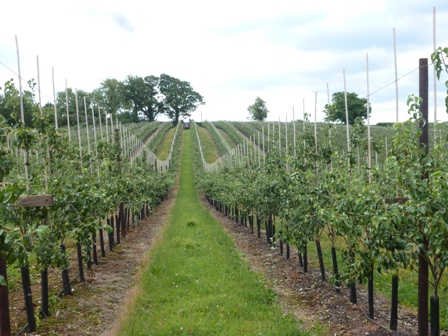
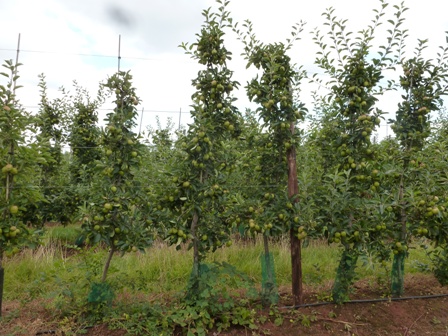
The rest of the farm is divided equally into Plums and Cider apples, with a few cherries: 'a small area, but delicious' said Michael.
During the visit the German growers saw Opal plums being picked and packed. Castle Fruit Farm grows a lot of high quality plums in addition to the Opals: 'Reeves Seedling, Jubileum, Valor, Victoria, Avalon and Marjories Seedling plus Reine Claude gages.
Below: Sorting and packing Opal plums at Castle Fruit Farm
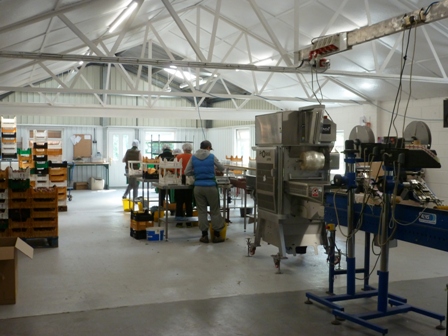
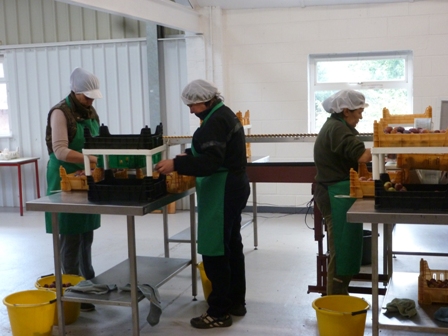
Below: left; Opal plums before sorting and right; 'the finished article' - Opal plums, packed and ready for dispatch
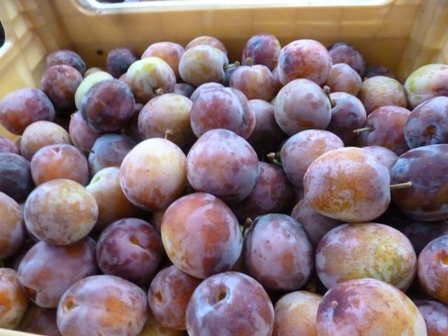
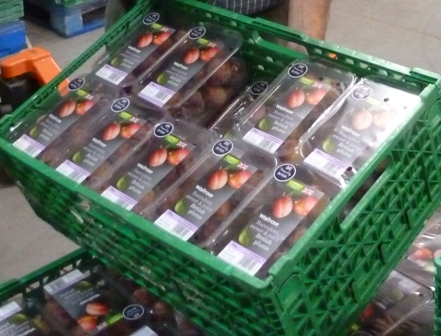
Cider apples have been a useful crop with low inputs an attraction, unfortunately there seems to be too many cider apples grown at the moment and prices are dropping. The 'cider varieties' Major, Harry Masters and Dabinet are grown at Castle Farm.
Below: left; Michael explains the vagaries of cider apple production to the German growers and right; typical cider trees at Castle Fruit Farm
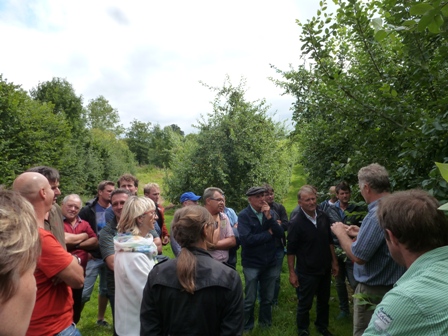
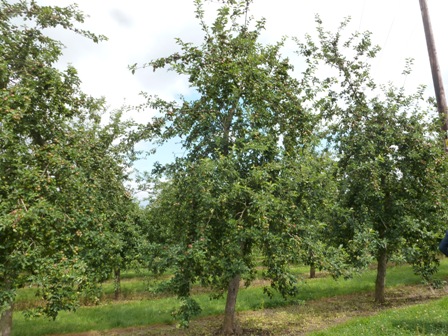
When Michael and Chrissy Bentley came to Castle Fruit farm in 2002, they came from an arable farming background. But inheriting their Manager Clive Maile who has amassed a wealth of experience and knowledge over his 37 years at Castle Fruit Farm, made the task a little less daunting. Michael and Chrissy have now been joined by their son Richie, who together with his wife Claire and sons Oskar and Rudi bring a great new energy to the farm......
In the early days of Michael and Christiana's tenure of Castle Fruit Farm, Leon Jahae who was a young Dutch advisor assisted in developing the 'philosophy for fruit growing' at Castle Farm.
Below: an extract from my last visit to Castle Fruit Farm published in The English Apple Man Journal for 8th October 2010
"Leon has been an invaluable asset in the transition of Castle Fruit Farm from a traditional fruit farm with less intensive orchards to a 'leading edge' approach with very intensive new plantings. The first of these, a Braeburn orchard planted in 2004 is now fulfilling it's promise. The Jazz, very close planted at 80cm apart looks superb.
The second Braeburn orchard planted at 80cm and 50cm apart created a working experiment comparing an Intensive planting with an Ultra Intensive planting. The rows are both 3.25 metres apart, allowing good light penetration into the lower aspects of the trees. Many growers would point out that 80cm is very intensive as a metre apart is a fairly standard planting distance on the majority of farms.
In these intensive trees, the aim is to produce a tree that is narrow and 8-10 feet tall with little pruning requirement. The best control mechanism is to initiate early and regular cropping. Varieties like Gala and Braeburn lend themselves to this tree management system.
As one would expect, yields in the early years were dramatically higher in the Ultra intensive planting, but as the tree cropping area expanded on the intensive plantings, the yield gap closed. In year 2 (second leaf - 18 month after planting) the Ultra intensive yield was 100% more. This reduced to 50% in year 3. 30% in year 4, and 25% by year 5. Clive Maile told me that on the Ultra intensive Braeburn, fruit size seems much more uniform, probably due to tree to tree root competition. This would be detrimental in a naturally smaller fruiting variety, but as Braeburn is more likely to grow too big if trees are vigorous, this close proximity appears to be delivering an unexpected bonus".
Below: left; these Braeburn were from the second 'tranche' of orchards planted by Michael & Chrissy and right; the trees are mechanically pruned in the summer to control vigour and enhance fruit colour and new fruit bud formation
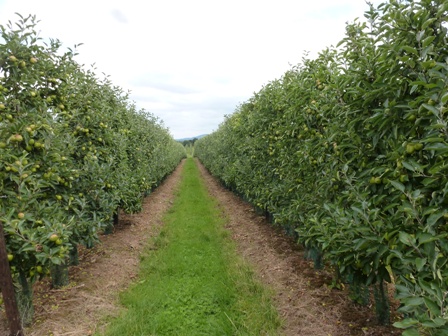
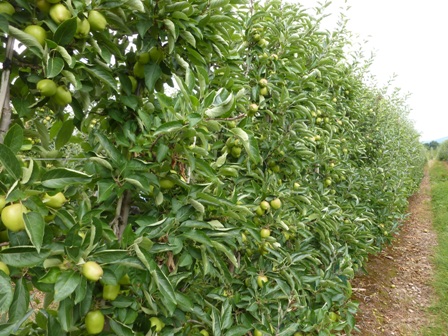
Below: left; a Gala orchard and right; one of the Jazz orchards at Castle Farm
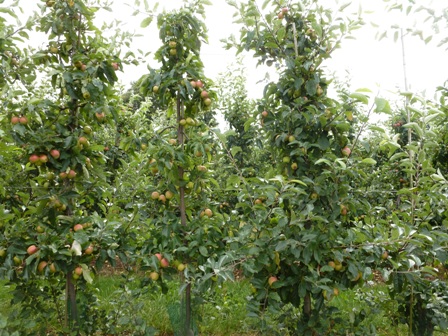
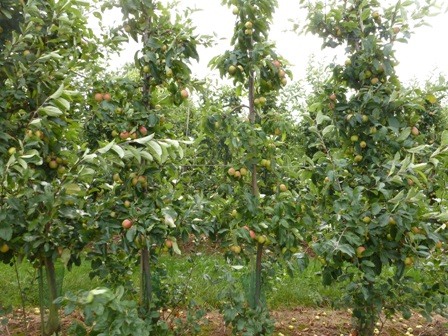
When Michael and Chrissy Bentley came to Castle Fruit farm in 2002, they came from an arable background. But inheriting their Manager Clive Maile who has amassed a wealth of experience and knowledge over his 37 years at Castle Fruit Farm, made the task a little less daunting. Michael and Chrissy have now been joined by their son Richie, who together with his wife Claire and sons Oskar and Rudi bring a great new energy to the farm......
Below: left; a new Jazz orchard and right; Michael favours compost mulch applied on one side of the trees, reducing the risk of mice damage to the trees beneath the mulch when the soil strip is fully covered with compost
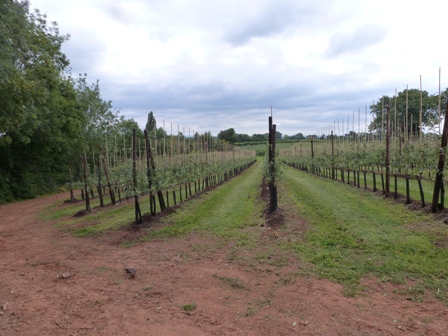
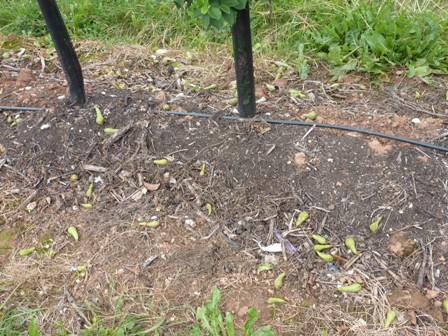
Below: left; Smitten trees and right; Victoria plums
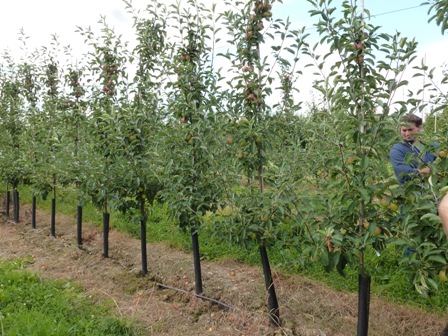
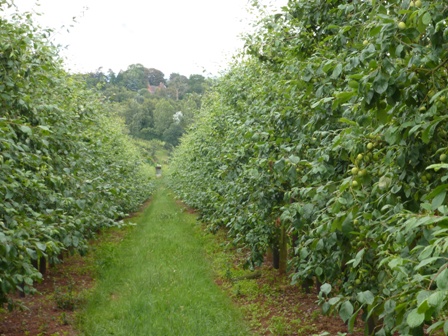
Below: left; a tractor on the hill with staff tying tree tops from a platform and right; a distant view of orchard spraying in progress
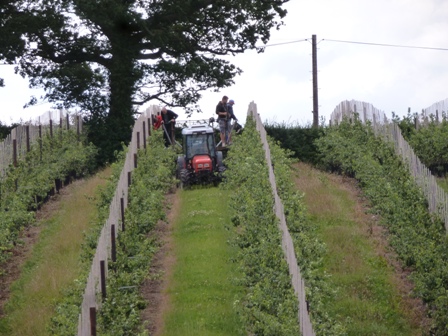
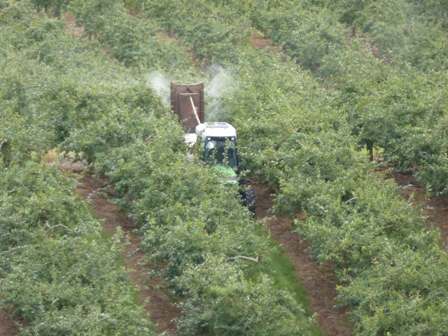
Below: the German growers pose with Michael and Chrissy Bentley after their enjoyable visit to Castle Fruit Farm
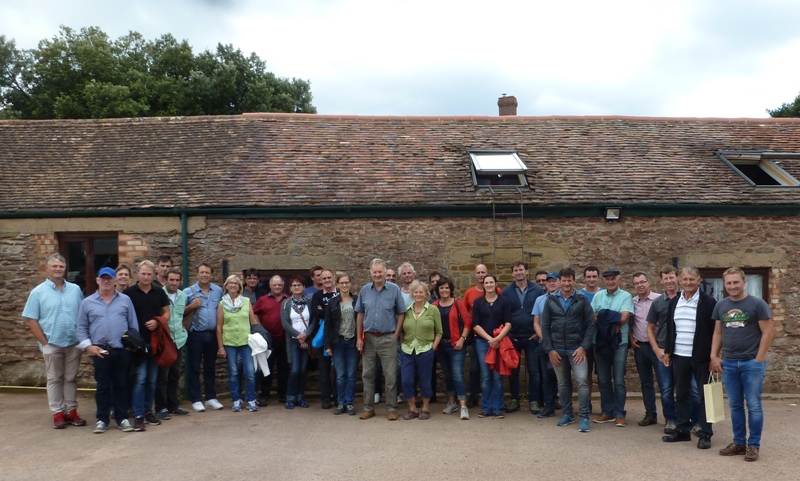
Michael and Chrissy Bentley and their team at Castle Fruit Farm are committed, not only to producing fruit of the highest quality, but also to growing in a sustainable and environmentally friendly way. This is demonstrated in the content of their excellent website: an extract below encapsulates their farming philosophy..........
Our Green Statement: Care for the environment and healthy food
Fruit production and all operations at Castle Fruit Farm are carried out with regard to the sustainable use of all resources on the farm including soil, water, air, wildlife habitats, landscape, and where they exist, archaeological features. Production methods integrate beneficial natural, biological and cultural processes into modern farming practices using the most appropriate technology. The complete process of growing the plums, storage, grading and packing the fruit is carried out at Castle Fruit Farm. All land that is not used for crop production is managed to maintain habitats capable of supporting the widest range of flora and fauna.
The English Apple Man encourages readers to 'explore' Bentleys Castle Fruit Farm website for an in depth illustration of the 'best practices' operating at Castle Fruit Farm..........
That is all for this week..........next week more about the visits to West Midlands.......
Take care
The English Apple Man
Is this the future of food production? TECHNOFARM